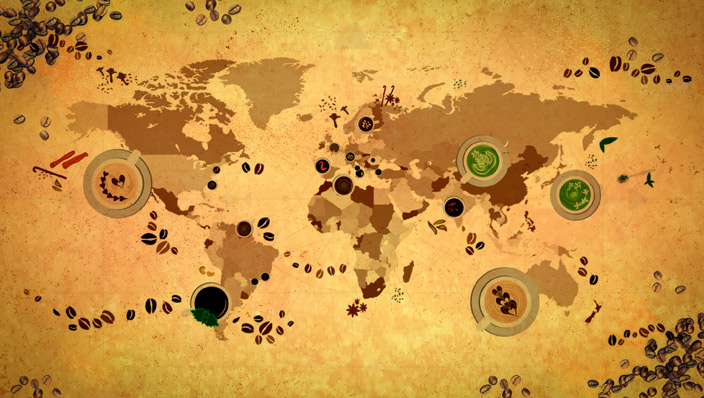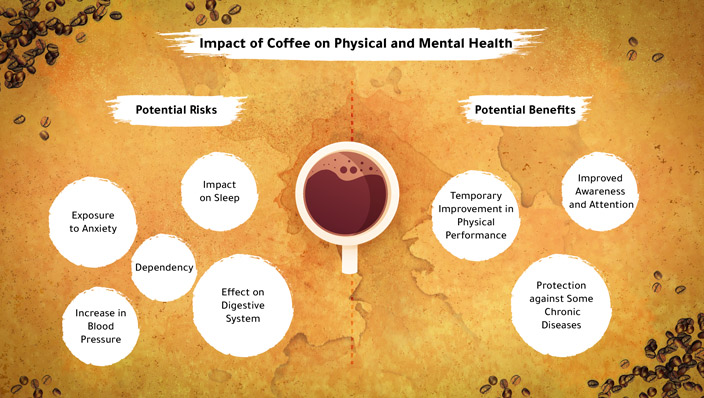 Arabic coffee
Arabic coffee
 Arabic coffee
Arabic coffee
"When crossing any street in the world, it may seem to you that coffee is a common language that unites people together from different cultures and countries. That magical spark brightens the morning, creating moments of social integration and deep communication.
In this article, we will delve into a world filled with the aroma of coffee, exploring the role of coffee in global culture and how the world celebrates it in various and astonishing forms. We will embark on an exciting journey to discover different customs that unite people around a cup of this wonderful beverage. From Italian espresso to beloved Turkish coffee, and from elegant Parisian cafes to modern boutiques offering various forms of coffee, this journey will take us to different worlds united by one passion: celebrating the culture of coffee."
Index:
Coffee Festivals and Cultural Events
The Impact of Coffee on the Economy and Trade
Coffee and Physical and Mental Health
History of the trade and spread of coffee in different cultures:
The history of coffee trading spans several centuries, spreading across various cultures through a long journey of commercial and cultural adventures. Here's an overview of the evolution of coffee trading and its spread in different cultures:
Early Centuries: Coffee is believed to have been first discovered in the region of Ethiopia and South Sudan in the early centuries AD. Coffee beans were used as food and in the form of a beverage with stimulating and enhancing effects.
15th Century: The trade of coffee expanded in the Middle East, spreading to major cities such as Mecca, Cairo, and Damascus. The first coffeehouses emerged in Cairo, serving coffee and providing a place for social gatherings and cultural discussions.
16th Century: The spread of coffee extended to the Arabian Peninsula, becoming an essential part of Arab culture. The first coffeehouses were established in Istanbul, contributing to the dissemination of coffee to other regions worldwide.
17th Century: Coffee cultivation moved to new areas such as the island of Java in Indonesia, which became a leading global producer for a period. Coffee spread to Europe through trade with Arab countries, leading to the establishment of the first coffeehouses in cities like Venice, London, and Paris.
18th Century: The cultivation of coffee expanded to new locations, including Brazil, which became one of the largest coffee producers globally.
19th Century and Beyond: The 19th century witnessed significant advancements in coffee roasting and preparation techniques. The coffee culture spread to various places around the world, influenced by different local rituals.
In general, it can be said that coffee spread from its original region in Ethiopia to different parts of the world through trade and cultural exchange. Coffee influenced the development of the economy, culture, and social interactions in various cultures and societies.
Don't miss: Arabian Coffee Spices - Recipes and Flavors

How have different cultures dealt with coffee?
Societies have interacted with coffee in various ways throughout history, leading to the formation of different habits and traditions in various cultures. Some examples include
Coffee in Arab Culture:
Coffee is considered an essential part of Arab culture and can be traditional and symbolic in many Arab countries. Arabic coffee (ground coffee with water and cardamom) is a symbolic beverage served to guests and during social occasions. It involves specific rituals like reading the coffee cup and interpreting the coffee grounds after consumption.
Coffee in Turkish Culture:
Turkish coffee is a significant part of Turkish heritage and culture, is known for its distinctive preparation and presentation. Turkish coffee is served in small cups with a sweet treat and includes rituals such as reading the coffee cup for spiritual insights.
Coffee in Italian Culture:
Italy is the birthplace of espresso and cappuccino, which have become integral to Italians' daily lives. Cafés in Italy serve as social hubs where people gather for news and conversations.
Coffee in Greek Culture:
Greek coffee, including varieties like frappé and ellinikó, is a popular beverage. Greek families enjoy coffee together at home and in cafés.
Coffee in Ethiopian Culture:
Coffee is an essential part of Ethiopian hospitality rituals, with the traditional coffee ceremony involving the serving of "buna" to guests. Coffee beans are roasted and ground manually before preparation.
Coffee in Brazilian Culture:
Brazil is one of the world's largest coffee producers, influencing the global coffee market. Brazilians prefer mixed coffee with milk and sugar, and coffee beverages are a part of social gatherings.

Various Coffee Festivals Worldwide:
There are numerous well-known coffee festivals worldwide that bring together coffee enthusiasts and showcase diverse cultures and traditions related to coffee consumption:
Coffee Festival in Colombia (Festival de Café de Manizales): Held in the city of Manizales, known for its coffee production in Colombia. The festival includes competitions, cultural events, and musical performances.
San Francisco Coffee Festival, United States: Considered one of the largest coffee festivals in the United States, offering a variety of coffee types, workshops, and tasting events.
London Coffee Festival, United Kingdom: One of the largest coffee festivals in Europe, held in London, featuring coffee exhibitions, workshops, and artistic events.
Addis Coffee Fest in Ethiopia: Held in the capital of Ethiopia, Addis Ababa, at the end of each year, showcasing the diversity of Ethiopian coffee and including cultural and artistic events.
Vienna Coffee Festival in Austria: Allows visitors to experience a variety of coffee varieties and enjoy the beautiful atmosphere of Vienna.
How to Prepare the Best Cold Coffee Drinks?

Impact of Technology on the Coffee Industry and the Development of New Preparation and Consumption Methods:
Technology has significantly impacted the coffee industry, improving the quality of roasting and brewing processes and enhancing the overall consumer experience. Technological advancements include:
Electronic and Automatic Machines: Machines designed for making coffee, such as electronic and automatic devices, simplify and expedite the coffee preparation process, offering options for various coffee beverages.
Smart Coffee Grinders: Smart grinder technology allows users to precisely adjust the grind size of coffee beans according to the desired type of coffee, contributing to different flavors and improved coffee quality.
Advanced Coffee Roasting Techniques: Advanced technology is utilized to improve coffee roasting processes, allowing precise control over temperature and roasting time to achieve better results.
Temperature and Pressure Control: Precision control of temperature and pressure in espresso machines ensures optimal flavor extraction, resulting in high-quality coffee.
Internet and App Technologies: Mobile applications and Internet platforms facilitate the sharing of information and experiences related to coffee preparation and consumption. Additionally, coffee enthusiasts can order various coffee beverages online.
Frozen and Freeze-Dried Coffee Processing: New processing techniques, including rapid freezing and freeze-drying, help preserve the quality and flavors of coffee for an extended period.
Use of Artificial Intelligence and Big Data: Some companies leverage modern technology to enhance coffee farming and harvesting processes through data analysis and the use of artificial intelligence to improve production.
In general, the impact of technology on the coffee industry has contributed to improving beverage quality and enhancing consumer convenience in preparation and consumption.

The Importance of the Coffee Industry in the Global Economy:
The coffee industry holds significant importance in the global economy and has a substantial impact on the trade of agricultural goods, evident in various areas:
Large Trade and Exports:
The coffee industry is one of the most crucial agricultural exports globally. Coffee represents one of the largest commodities in the world, with a value in the billions of dollars annually.
Job Opportunities:
The coffee industry provides employment opportunities for millions of people worldwide, whether in the cultivation and harvesting of coffee beans or the processing, roasting, and marketing of grains.
Economic Impact on Producing Countries:
Coffee serves as a vital revenue source for producing countries, playing a role in promoting economic growth and improving the livelihoods of farmers.
Impact of Coffee on Agricultural Trade:
Crop Diversity and Production Variety: Reliance on coffee cultivation by many countries contributes to diversifying their economic income sources, reducing dependence on other agricultural goods, and expanding the scope of production.
Economic Impact on Importing Countries:
Importing countries of coffee experience significant economic effects in meeting their coffee needs and satisfying consumer preferences. This substantial consumption contributes to boosting retail sectors and hospitality services.
Social and Environmental Impact:
The coffee industry contributes to improving the livelihoods of local populations in some producing countries by providing employment opportunities and supporting community development projects. However, intensive coffee farming may face environmental challenges like deforestation and carbon emissions.
Estimation of Agricultural Product Value:
The coffee industry enhances the value of agricultural assets and stimulates innovation in areas such as coffee cultivation, roasting, and presentation.
In general, the coffee industry promotes trade and contributes to enhancing the global economy. Its impact on agricultural trade extends to various sectors and involved countries.
Discover Exceptional Recipes for Arabic Tea and Coffee
Impact of Coffee on Physical and Mental Health: Benefits and Potential Risks:
The impact of coffee on physical and mental health has been extensively studied, revealing both benefits and potential risks associated with its consumption. It is important to note that the effects of coffee can vary from person to person based on factors such as the quantity consumed and individual tolerance. Here is an overview of the potential benefits and risks of coffee consumption:
Potential Benefits:
Improved Awareness and Attention:
Coffee, containing caffeine, is believed to contribute to increased awareness and attention, enhancing mental performance.
Temporary Improvement in Physical Performance:
Coffee may lead to a temporary increase in physical activity performance, proving beneficial during physical exercises.
Protection against Some Chronic Diseases:
Research suggests that coffee consumption may be associated with a reduced risk of certain chronic diseases such as type 2 diabetes, cardiovascular diseases, and some types of cancer.
Potential Risks:
Impact on Sleep:
The caffeine in coffee can affect the quality of sleep, and consuming it in the afternoon may disrupt nighttime sleep.
Exposure to Anxiety:
In some individuals, consuming large amounts of coffee may lead to increased anxiety, stress, and jitteriness.
Effect on Digestive System:
Coffee may cause acidity, bloating, and diarrhea in some individuals.
Dependency:
Regular coffee consumption may lead to caffeine addiction, resulting in withdrawal effects when reducing consumption.
Increase in Blood Pressure:
Coffee may raise blood pressure in some individuals, especially when consumed in large quantities.
It is important to emphasize moderation in coffee consumption to avoid potential health issues. Individuals with chronic conditions or those planning lifestyle changes should always consult with a healthcare professional.

Coffee plays a significant cultural role in people's lives worldwide, forming part of diverse traditions and customs associated with social gatherings, communication, and enjoying special moments. Key cultural aspects represented by coffee include:
Social and Communicative Role:
Coffee is an essential element in social communication, serving as a starting point for various conversations among friends, family, and colleagues.
Meeting and Relaxation Spaces:
Cafés and coffee-serving establishments provide places for people to meet, relax, and enjoy moments of contemplation or reading.
Cultural and Social Traditions:
In some cultures, coffee consumption has specific traditions and rituals. For instance, in certain Arab countries, prepared coffee is a symbol of generosity and hospitality.
Barista Art:
The skilled and artistic preparation of coffee, known as barista art, involves creating various coffee styles with exquisite designs on the coffee's surface.
Coffee Beverage Culture:
Drinks like espresso, cappuccino, and latte are integral to coffee culture, evolving continuously and expressing the uniqueness of different cultures.
Harvest Season and Celebrations:
In some coffee-farming regions, the harvest season and related celebrations bring people together, fostering social interaction and community bonds.
Literature and Art Inspiration:
Coffee serves as a source of inspiration for writers, poets, and artists. Representations of coffee can be found throughout history in literature and art.
In general, coffee has a profound cultural impact, promoting social and cultural bonds in diverse societies worldwide.